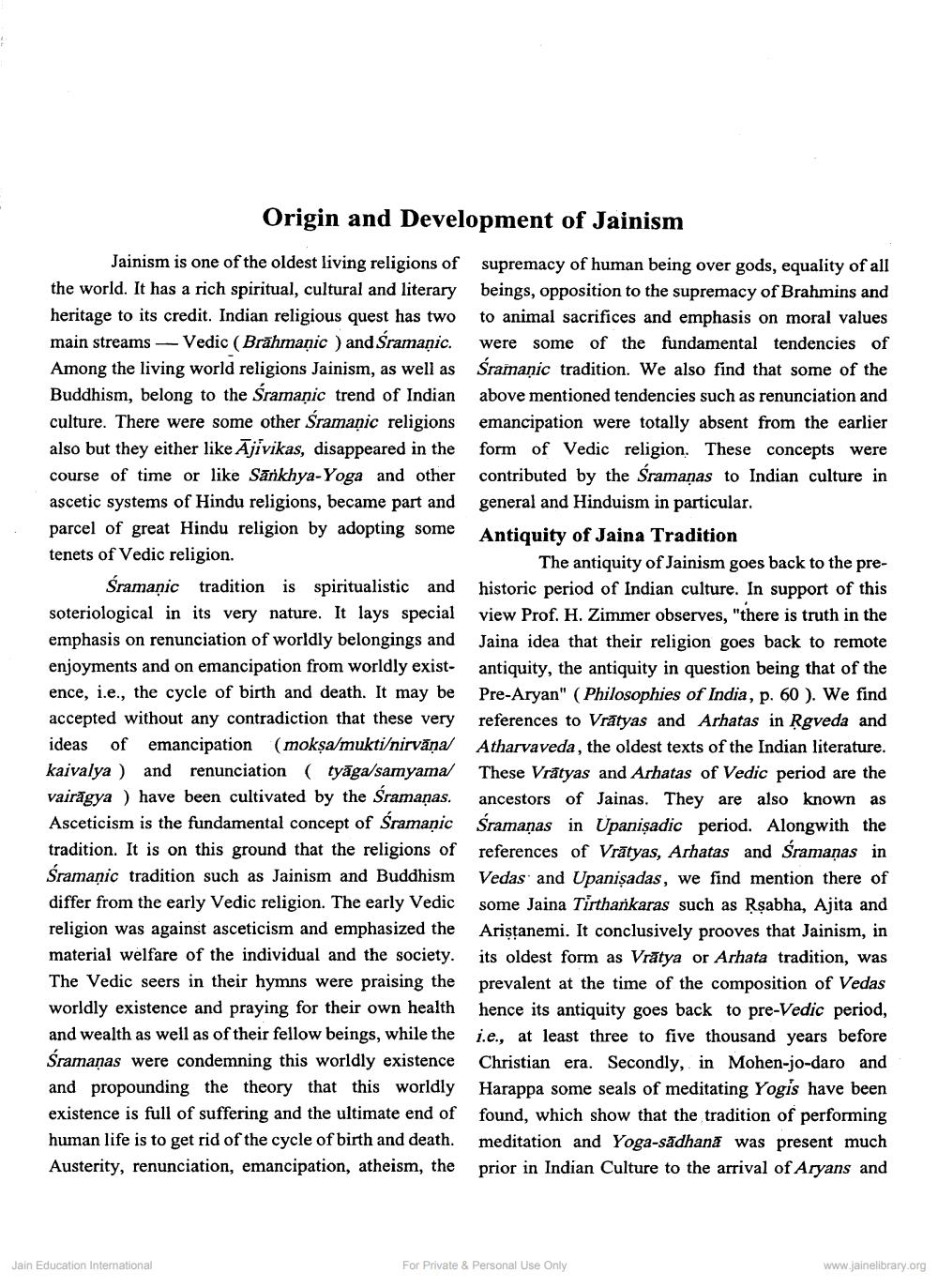________________
Origin and Development of Jainism
Jainism is one of the oldest living religions of supremacy of human being over gods, equality of all the world. It has a rich spiritual, cultural and literary beings, opposition to the supremacy of Brahmins and heritage to its credit. Indian religious quest has two to animal sacrifices and emphasis on moral values main streams - Vedic ( Brāhmaṇic ) and śramaņic. were some of the fundamental tendencies of Among the living world religions Jainism, as well as sramanic tradition. We also find that some of the Buddhism, belong to the śramanic trend of Indian above mentioned tendencies such as renunciation and culture. There were some other Sramanic religions emancipation were totally absent from the earlier also but they either like Ājivikas, disappeared in the form of Vedic religion. These concepts were course of time or like Sārkhya-Yoga and other contributed by the Sramaņas to Indian culture in ascetic systems of Hindu religions, became part and general and Hinduism in particular. parcel of great Hindu religion by adopting some Antiquity of Jaina Tradition tenets of Vedic religion.
The antiquity of Jainism goes back to the preSramanic tradition is spiritualistic and historic period of Indian culture. In support of this soteriological in its very nature. It lays special view Prof. H. Zimmer observes, "there is truth in the emphasis on renunciation of worldly belongings and Jaina idea that their religion goes back to remote enjoyments and on emancipation from worldly exist- antiquity, the antiquity in question being that of the ence, i.e., the cycle of birth and death. It may be Pre-Aryan" (Philosophies of India, p. 60 ). We find accepted without any contradiction that these very references to Vrätyas and Arhatas in Rgveda and ideas of emancipation (mokṣa/mukti/nirvāņa/ Atharvaveda, the oldest texts of the Indian literature. kaivalya ) and renunciation ( tyāga/samyama These Vrâtyas and Arhatas of Vedic period are the vairāgya ) have been cultivated by the Sramaņas. ancestors of Jainas. They are also known as Asceticism is the fundamental concept of Šramanic Sramaņas in Upanişadic period. Alongwith the tradition. It is on this ground that the religions of references of Vrātyas, Arhatas and Śramaņas in Śramanic tradition such as Jainism and Buddhism Vedas and Upanişadas, we find mention there of differ from the early Vedic religion. The early Vedic some Jaina Tirtharkaras such as Rşabha, Ajita and religion was against asceticism and emphasized the Aristanemi. It conclusively prooves that Jainism, in material welfare of the individual and the society. its oldest form as Vrātya or Arhata tradition, was The Vedic seers in their hymns were praising the prevalent at the time of the composition of Vedas worldly existence and praying for their own health hence its antiquity goes back to pre-Vedic period, and wealth as well as of their fellow beings, while the i.e., at least three to five thousand years before Śramaņas were condemning this worldly existence Christian era. Secondly, in Mohen-jo-daro and and propounding the theory that this worldly Harappa some seals of meditating Yogis have been existence is full of suffering and the ultimate end of found, which show that the tradition of performing human life is to get rid of the cycle of birth and death. meditation and Yoga-sadhana was present much Austerity, renunciation, emancipation, atheism, the prior in Indian Culture to the arrival of Aryans and
Jain Education International
For Private & Personal Use Only
www.jainelibrary.org




